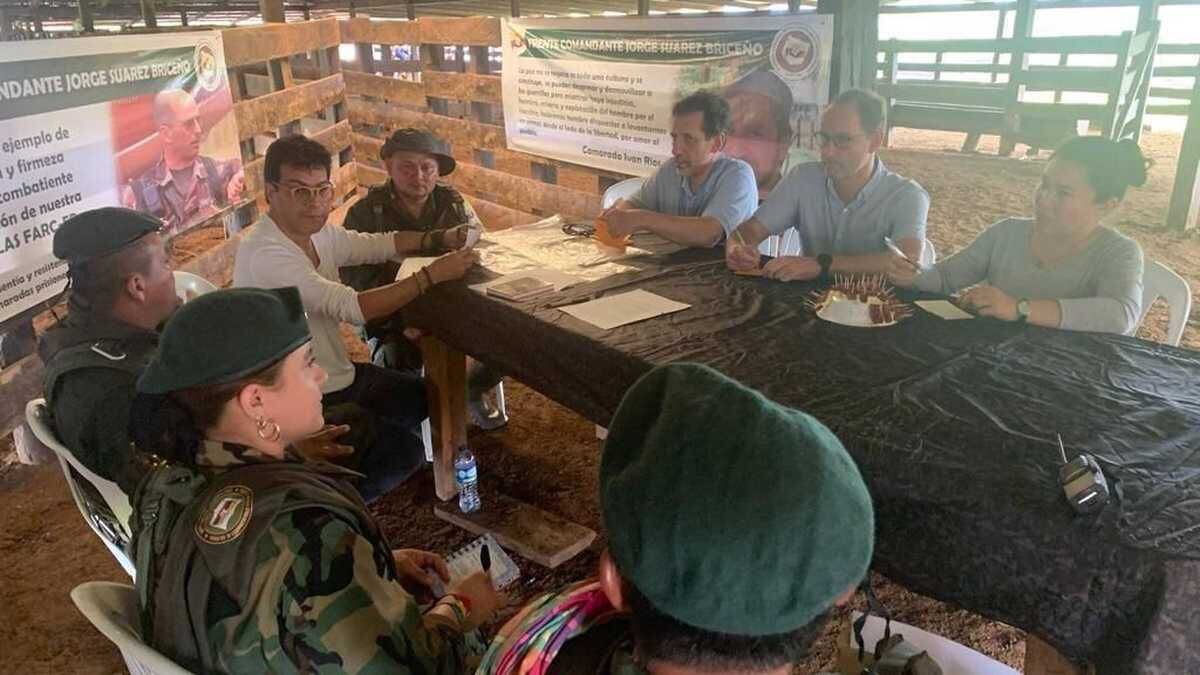the opposition lace From the start, the FARC has been one of the biggest challenges to the comprehensive peace pursued by the government of Gustavo Petro. Disagreements, plural, since more than one faction withdrew – at different times – from the talks in Havana that led to the signing of the peace agreement at the end of 2016. Now, the truce with various armed groups has shown that the roads are divided between submission and negotiation for opponents wishing to join forces The ambitious political banner of the President of Colombia.
After it announced that the new year would approach, it had reached a bilateral agreement for a six-month ceasefire Five different organizationsPetro signed the same number of decrees specifying the terms of each of those armistices. Amid controversy, Govt NLA suspended After the last active guerrilla war in Colombia, he denied reaching that agreement. Still resolute, the other four include the main defectors from the former FARC: the Central General Staff and the Second Marquetalia. The list is completed by the Clan del Golfo, the largest drug cartel, heir to the paramilitary groups, which call themselves the Self-Defense Forces of Colombia, the Gitanistas and the Self-Defense Forces of the Sierra Nevada.
Although there are similarities between the respective decrees, what has attracted the most attention are the differences between them. While the formulation for the National Liberation Army and the Central General Staff speaks of a “peace process”, for the Segunda Marquetalia, the Clan del Golfo and the Sierra Nevada Self-Defense Forces, it refers to “the facilitation of the establishment of a table of dialogue and the achievement of the submission and dismantling of justice”. That is, the last three organizations, in principle, were not endowed with any political character.
Interior Minister Alfonso Prada said that the door is not closed and that language is not final. Besides the five decrees, the government issued an additional decision to form a high-level body responsible for classifying and characterizing armed groups. Its members are Defense Minister Ivan Velazquez. High Commissioner for Peace Danilo Rueda. and the National Director of Intelligence, Manuel Alberto Casanova. “Once we have the final decision of the body, we will also take a decision on the part of the government on the path we will proceed in, if the political situation is recognized or we remain at the level of the conversation with the aim of introducing and dismantling high-impact criminal organizations, as defined by law,” Prada explained after Recognize the complexity of these processes.
The episode and the language chosen, however, reopen a thorny debate about where schism will occupy in perfect peace, a problematic issue for several reasons. Most of the former FARC combatants have converted to legitimacy. More than 90% of the signatories to the agreement, some 13,000 former combatants, have fulfilled their obligations. But the defectors have destabilized security conditions in many areas, sabotaging peacebuilding efforts and threatening security guarantees for ex-combatants and their families under the agreements. It is an archipelago of more than 20 groups that are difficult to classify. In Colombia, six internal armed conflicts remain, half of which involve dissident factions, According to the budget of the International Committee of the Red Cross.
The opposition, in the final phase of negotiations with the FARC, began one of its most representative structures, the First Front, which operated in the southeast of the country, In mid-2016, I published a statement disengaging from the processwhich he described as “treason”. This announcement caused Farc leadership Five managers firedincluding Gentile Duarte.
the news
Current affairs analysis and the best stories from Colombia, every week in your mailbox
Since then, other factions have appeared in different regions, but the phenomenon took on a new dimension in August 2019, when Ivan Marquez, who was the chief negotiator in the talks with the government, announced that Take up arms with other bosses They signed peace. Although no defeat from the signatories many had feared, the new dynamics of conscription rekindled the fires of dissent.
The streams of Gentil Duarte – Central General Staff – and Iván Márquez – Segunda Marquitalia, due to the place of birth of the FARC, have consolidated themselves as the most famous. The US government designated both as terrorist organizations when it pulled off that blacklist. of the Revolutionary Armed Forces of Colombiahas already been disarmed turned into a political party. Duarte and Marquez also engaged in a war to the death They were falling off In confused encounters – often across the border with Venezuela – the main leaders of both factions, Including Duarte himselfrelieved by Ivan Mordesco – who in turn reappeared to declare his willingness to join the Perfect Peace after he was left for dead. Marquis also suffered an attack but is still alive, according to the Peace Commissioner.
It makes sense that the Segunda Marquetalia do not receive political treatment and that the General Staff does, says Luis Fernando Trejos, an analyst at the UNCaribe think tank. “The General Staff is dissident, that is, none of them entered the operation, it was all orders and structures that separated from the negotiations and maintained their criminal activity, while the second Marchitalia was rearmed,” he said. “It’s a difference that should help understand why some receive political treatment and others don’t.” “What they call opponents are very dynamic,” he notes at the end.
Jorge Mantilla, of Ideas for Peace, believes that everything remains in a “gray area”. And although the decrees differ in terms of peace and surrender, in practice, the cessation of offensive operations by the general force and the verification mechanisms are the same, he warns. What will be final is how the new top-level instance qualifies these groups. He concludes: “We return to the practical problem of a comprehensive peace, which is how to maintain disparate talks, but at the same time, with different actors at war with each other.”
Subscribe here To the EL PAÍS newsletter about Colombia and receive all the essential information about the current affairs of the country.

“Unapologetic tv specialist. Hardcore zombie trailblazer. Infuriatingly humble problem solver.”

:quality(85)/cloudfront-us-east-1.images.arcpublishing.com/infobae/HGOYPOJL2FFWTDH76HD3XU5B4I.jpg)
:quality(85)/cloudfront-us-east-1.images.arcpublishing.com/infobae/XM4MNLW34ZEJBNZJJSJCSOMCII.PNG)




More Stories
Xi receives Putin on a state visit to China that shows unity among allies
Verde Olivo magazine celebrates 65 years › Culture › Granma
News, situation in Ukraine and more